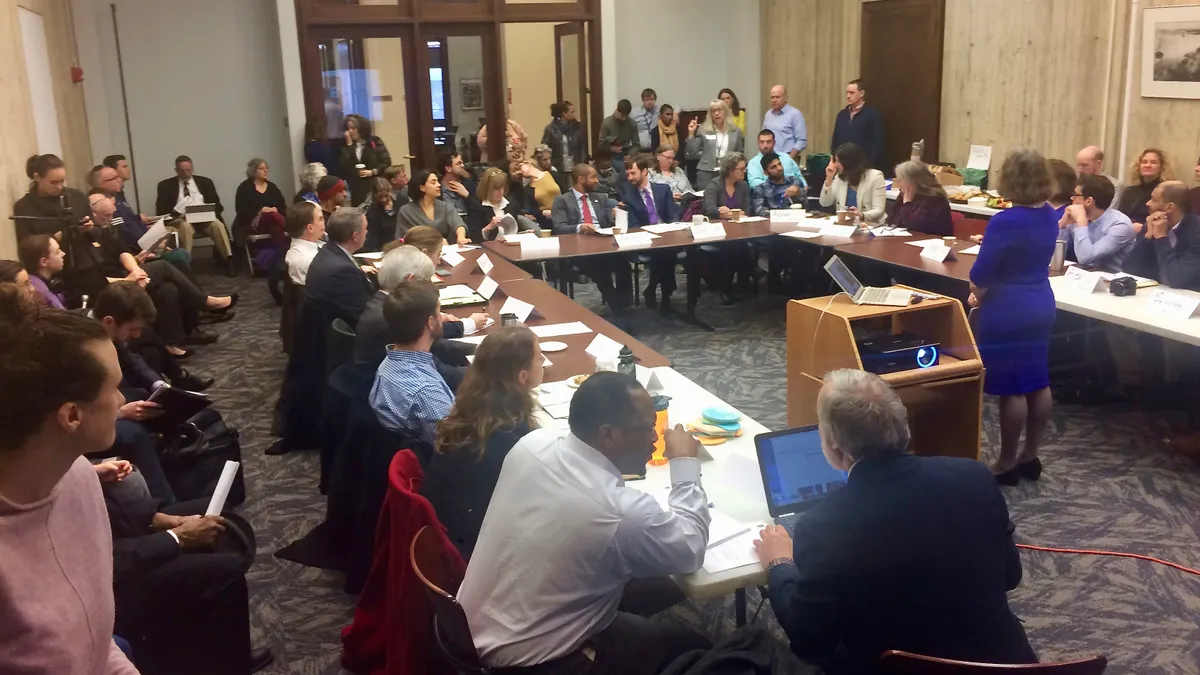Dive Brief:
- Boston's Zero Waste Advisory Committee met for the first time Feb. 12, to officially launch what is expected to be a 9-month planning process. The group — comprising city officials, business representatives, neighborhood leaders, environmental advocates and others — was told "everything is on the table" by the lead consultants.
- New data showed how far the city has to go. The residential stream (including multi-unit buildings) has an estimated 240,000 tons of material with a 21% diversion rate. The industrial, commercial and institutional (ICI) stream has a rougher estimate of 915,700 tons with a 25% diversion rate. Based on characterization studies at nearby waste-to-energy facilities, each stream includes nearly 40% of recyclable material that could be captured.
- Following an overview of what "zero waste" means (using the Zero Waste International Alliance definition), the group split up to review possible options presented by the consultants. During the residential subcommittee, implementation of a pay-as-you-throw program, better enforcement for illegal dumping and the effects of various policies on low-income residents were the main topics. Waste Dive didn't attend the ICI subcommittee, but confirmed through multiple sources that the possibility of exclusive franchise contracts was one of the more contentious topics discussed.
Dive Insight:
This day had been a long time coming for "zero waste" supporters in the city. After years of advocacy, multiple 2016 summits funded by state grants, a 2017 consulting RFP and a January postponement due to a blizzard, the work is underway. These efforts are being led by local firm Perlmutter Associates and include a number of familiar names on the team.
As outlined in the $148,000 contract, this team has been tasked with facilitating, gathering and analyzing data, preparing an assessment of reduction and diversion opportunities, performing a cost-benefit analysis and drafting a final "zero waste" plan. In addition, the team also plans to work on a recycling market development study and public education concepts.
During the introduction, San Francisco and Seattle were held up as the models for "zero waste" plans. The fact that New York, Philadelphia and Washington, D.C. have set their own goals was also mentioned. Boston would be the first major city in New England to follow suit.
Local factors differ in each case, but political commitment was said to be one of the overarching factors. Amy Perlmutter, who managed San Francisco's early recycling efforts, said this was even more important for cities that export their waste.
"No one is going to agree to take our waste unless we are showing them that we are doing everything we can to reduce our waste," she said.
Boston currently has disposal contracts with multiple Covanta and Wheelabrator waste-to-energy facilities in the region. Those contracts, along with the city's residential recyclable processing contract with Casella, are all up for renewal in 2019. The goal is to release a "zero waste" plan by the end of the year to potentially help influence the bidding process.
"There's a very immediate and tangible impact of your recommendations that could be happening in this particular sector," said Gary Liss, of Zero Waste Associates, during the residential subcommittee.
Depending on what recommendations the full committee arrives at, there could even be new contracts. Curbside organics collection for food scraps and compostable paper was listed as one potential residential option. Neighboring Cambridge is scheduled to expand its curbside organics program citywide in April.
Other options range from ideas that could require state or local legislation, such as expanding extended producer responsibility, to more voluntary measures, such as encouraging food recovery for donation and developing new community education models.
Local recycling market pressures and reports of a rocky franchise transition from Los Angeles may complicate matters. Good news about expanding organics capacity in the state may help. All of it will make for the most robust year of discussion about Boston's waste management plans that the city has seen in a long time.












